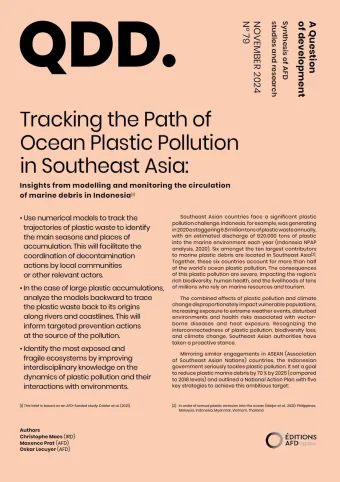Share the page
Tracking the Path of Ocean Plastic Pollution in Southeast Asia
Published on

Insights from modelling and monitoring the circulation of marine debris in Indonesia
Southeast Asian countries face a significant plastic pollution challenge. This policy brief explores how advancements in modeling plastic particle trajectories can further contribute to the region’s efforts in tackling plastic pollution. In coastal areas, currents and interactions with the seabed significantly influence plastic fate. The study’s advancements in modeling plastic particle trajectories offer a valuable tool for understanding the entire plastic pollution life cycle, from source points to accumulation zones. It brings insights for developing targeted mitigation strategies and evidence-based policies. Predictive models of plastic pollution help identify major sources of pollution,enabling more targeted solutions upstream or downstream to optimize clean-up efforts. International research networks like PASSPORT-2C and PISCES Relay offer powerful collaboration platforms designed for tropical ecosystems.
Useful Information
-
Authors
-
Christophe Maes, Maxence Prat, Oskar LECUYER
-
Edition
-
79
-
Number of pages
-
4
-
ISSN
-
2428-8926
-
Collection
-
A Question of Development
-
Other languages
